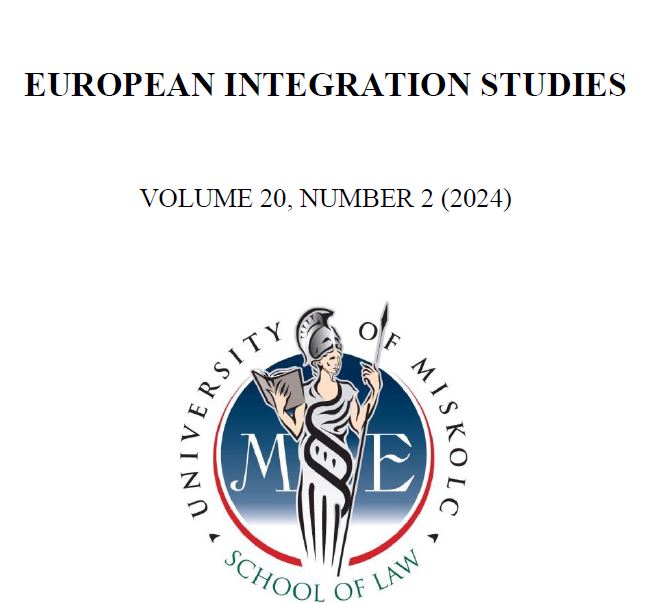The growing role of the European Commission in defence capability development
DOI:
https://doi.org/10.46941/2024.2.12Keywords:
Defence industry, European Commission, Common Security and Defence Policy, Europeanisation, SWOT.Abstract
The aim of this research is to present and analyse the growing role of the European Commission in defence capability development. In the first section, I review the literature on the theoretical background of the Commission’s role in the European defence policy. In the second section, I briefly present the decision-making processes in the fields of Common Foreign and Security Policy and Common Security and Defence Policy. Following the discussion of the external factors that underpin these developments, I elaborate on the past role of the European Commission and how it has changed after the recent Russian aggression in the Ukraine. I then use SWOT analysis to highlight the strengths, weaknesses, opportunities and threats to the role of the Commission in European defence. Although several EU member states and institutions supported the further integration of defence policy following the creation of the European Security and Defence Policy in early 2000, the defence-related activities of the EU remained weak and limited. Similar to the wars in Yugoslavia in the 1990s, the full-scale Russian invasion in Ukraine in recent years has spurred further development and “Europeanisation” of this policy area. During the last decade, the EU has set the defence agenda in motion and has launched new military-related initiatives due to the deteriorating security environment in the EU’s neighbourhood. This has sometimes even involved breaking the taboos on defence and strengthening the role of the Commission significantly in the defence industry and space sectors. Following the creation of the European Defence Fund, the most important development in this area concerned the possibility of using EU budget money for defence purposes. Although the defence industry and market of the EU is still fragmented and underfinanced, the European Commission has launched important initiatives to overcome these challenges.
References
Béraud-Sudreau, L., Pannier, A. (2021) ’An ‘improbable Paris-Berlin-Commission triangle’: usages of Europe and the revival of EU defense cooperation after 2016’, Journal of European Integration, 43(3), pp. 295-310; https://doi.org/10.1080/07036337.2020.1740215.
Chappell, L., Exadaktylos, T. Petrov, P. (2020) ’A more capable EU? Assessing the role of the EU’s institutions in defence capability development’, Journal of European Integration, 42(4), pp. 583-600; https://doi.org/10.1080/07036337.2019.1666115.
Cini, M. (2014) ’The European Commission after the reform’, in Magone, J. (Ed.) Routledge Handbook of European Politics, UK: Routledge, pp. 235-247.
Cini, M. (2015) ‘Good Governance and Institutional Change: Administrative Ethics Reform in the European Commission’, Journal of Contemporary European Research, 12(1), pp. 440-454; https://doi.org/10.30950/jcer.v12i1.705.
Dealtry, T. R. (1992) Dynamic SWOT analysis. Developer’s Guide. Birmingham: Dynamic SWOT Associates.
Egeberg, M., Gornitzka, Å., Trondal, J. (2014) ’A Not So Technocratic Executive? Everyday Interaction between the European Parliament and the Commission’, West European Politics, 37(1), pp. 1–18; https://doi.org/10.1080/01402382.2013.832952.
Farrall, S. (2021) ’Historical and Constructivist Institutionalisms’, in Farrall, S. (ed.) Building Complex Temporal Explanations of Crime. Critical Criminological Perspectives. UK: Palgrave Macmillan, Cham, pp. 29 – 50; https://doi.org/10.1007/978-3-030-74830-2_3.
Fotini, B. (2020) ’The Strategic Context of the European Security and Defence Policy’, in Voskopoulos, G. (ed.) European Union Security and Defence, Policies, Operations and Transatlantic Challenges, Springer, Cham, pp. 25-37; https://doi.org/10.1007/978-3-030-48893-2_2.
Håkansson, C. (2021) ’The European Commission’s new role in EU security and defence cooperation: the case of the European Defence Fund’, European Security, 30(4), pp. 589-608; https://doi.org/10.1080/09662839.2021.1906229.
Håkansson, C. (2024) ‘The Ukraine war and the emergence of the European commission as a geopolitical actor’, Journal of European Integration, 46(1), pp. 25–45; https://doi.org/10.1080/07036337.2023.2239998.
Haroche, P. (2020) ’Supranationalism strikes back: a neofunctionalist account of the European Defence Fund’, Journal of European Public Policy, 27(6), pp. 853-872, https://doi.org/10.1080/13501763.2019.1609570.
Karppi, I., Kokkonen, M., Lähteenmäki-Smith, K. (2001) ‘SWOT-analysis as a basis for regional strategies’, Nordregio Working Paper, 2001/4, [Online]. Available at: https://www.diva-portal.org/smash/get/diva2:700483/FULLTEXT01.pdf (Accessed: 30 April 2024).
Lavallée, C. (2013) ‘From the rapid reaction mechanism to the instrument for stability: The empowerment of the European commission in crisis response and conflict prevention’, Journal of Contemporary European Research, 9(3) Special Issue, pp. 372-389; https://doi.org/10.30950/jcer.v9i3.517.
Maulny, J (2023) The impact of the war in Ukraine on the European defence market. [Online]. Available at: https://www.iris-france.org/wp-content/uploads/2023/09/19_ProgEuropeIndusDef_JPMaulny.pdf (Accessed: 30 April 2024).
Molnár, A. (2022) ’The idea of a European Security and Defence Union’, in Molnár, A., Fiott, D., Asderaki, F., Paile-Calvo, S. (eds.) Challenges of the Common Security and Defence Policy. ESDC 2nd Summer University Book. Luxemburg: Publications Office of the European Union, pp. 19–36.
Molnár, A., Jakusné Harnos, É. (2023) ’The Postmodernity of the European Union: A Discourse Analysis of State of the Union Addresses’, The International Spectator, 58(1), pp. 58–74; https://doi.org/10.1080/03932729.2022.2149177.
Müller, P., Slominski, P., Sagmeister, W. (2023) ’Supranational Self‐Empowerment Through Bricolage: The Role of the European Commission in EU Security and Defence’, Journal of Common Market Studies. 61(6), pp. 1672–1691; https://doi.org/10.1111/jcms.13564.
Nugent, N., Rhinard, M. (2019) ’The ‘political’ roles of the European Commission’, Journal of European Integration, 41(2), pp. 203–220; https://doi.org/10.1080/07036337.2019.1572135.
Radaelli, C. (1997) ’How does Europeanization produce domestic policy change? Corporate Tax Policy in Italy and the United Kingdom’ Comparative Political Studies, 30(5), pp. 553-575; https://doi.org/10.1177/0010414097030005002.
Radaelli, C. M. (2004) ’Europeanisation: Solution or Problem? European Integration Online Papers 8(16), [Online]. Available at: https://eiop.or.at/eiop/pdf/2004-016.pdf (Accessed: 30 April 2024).
Sabatino, E. (2022) ‘The European defence fund: a step towards a single market for defence?’, Journal of European Integration, 44(1), pp. 133–148; https://doi.org/10.1080/07036337.2021.2011264.
Schnitzl, G. (2023) EDIRPA/EDIP: Risks and opportunities of future joint procurement incentives for the European defence market. French Institute for International and Strategic Affairs, 2023 (March), [Online]. Available at: https://www.iris-france.org/wp-content/uploads/2023/03/ARES-81-Policy-paper.pdf (Accessed: 30 April 2024).
Smith, M. E. (2012) ‘13 Developing a ‘Comprehensive Approach’ to International Security: Institutional Learning and the CSDP’, in Richardson, J. (ed.) Constructing a Policy-Making State? Policy Dynamics in the EU, online edn, Oxford: Oxford Academic, pp. 252-269; https://doi.org/10.1093/acprof:oso/9780199604104.003.0013.
Tardy, T. (2018) ’Does European defence really matter? Fortunes and misfortunes of the Common Security and Defence Policy’, European Security, 27(2), pp. 119–137; https://doi.org/10.1080/09662839.2018.1454434.
Zeilinger, B. (2021) ’The European Commission as a Policy Entrepreneur under the European Semester’, Politics and Governance, 9(3), pp. 63–73; https://doi.org/10.17645/pag.v9i3.4102.
Zwolski, K. (2020) ‘Diversified in unity: the agenda for the geopolitical European Commission’, Global Affairs, 6(4–5), pp. 519–535; https://doi.org/10.1080/23340460.2020.1834427.
European Commission (2022b) Proposal for a regulation of the European Parliament and of the Council on establishing the European defence industry reinforcement through common Procurement Act. COM/2022/349), [Online]. Available at: https://eur-lex.europa.eu/legal-content/EN/TXT/?uri=CELEX:52022PC0349 (Accessed: 30 April 2024).
European Commission (2023a) Proposal for a Regulation of the European Parliament and of The Council on establishing the Act in Support of Ammunition Production. Brussels, 3.5.2023 COM(2023) 237 final 2023/0140(COD), [Online]. Available at: https://eur-lex.europa.eu/legal-content/EN/TXT/?uri=CELEX%3A52023PC0237 (Accessed: 30 April 2024).
European Commission and High Representative of the Union for Foreign Affairs and Security Policy (2022a) Joint communication to the European Parliament, the European Council, the Council, the European Economic and Social Committee and the Committee of the Regions on the Defence Investment Gaps Analysis and Way Forward. 18 May 2022. [Online]. Available at: https://commission.europa.eu/system/files/2022-05/join_2022_24_2_en_act_part1_v3_1.pdf (Accessed: 30 April 2024).
European Council (2022) Informal meeting of the Heads of State or Government, Versailles Declaration 10 and 11 March 2022. [Online]. Available at: https://www.consilium.europa.eu/media/54773/20220311-versailles-declaration-en.pdf (Accessed: 30 April 2024 ).
European Parliament (2013) The development of a European Defence technological and Industrial Base (EDTIB). EXPO/B/SEDE/2012/20. [Online]. Available at: https://www.europarl.europa.eu/RegData/etudes/etudes/join/2013/433838/EXPO-SEDE_ET(2013)433838_EN.pdf (Accessed: 30 April 2024).
European Parliament (2019) The state of the debate on the Future of Europe European Parliament resolution of 13 February 2019 on the state of the debate on the future of Europe (2018/2094(INI)), P8_TA(2019)0098, European Parliament, [Online]. Available at: https://www.europarl.europa.eu/doceo/document/TA-8-2019-0098_EN.pdf?redirect (Accessed: 30 April 2024).
European Parliament (2023) European defence industry reinforcement through common procurement act (EDIRPA). EU legislation in progress, [Online]. Available at: https://www.europarl.europa.eu/RegData/etudes/BRIE/2023/739294/EPRS_BRI(2023)739294_EN.pdf (Accessed: 30 April 2024).
Official Journal of the EU (2023a): Regulation (EU) 2023/1525 of the European Parliament and of the Council of 20 July 2023 on supporting ammunition production (ASAP), [Online]. Available at: https://eur-lex.europa.eu/legal-content/EN/TXT/?uri=CELEX%3A32023R1525&qid=1695904709752 (Accessed: 30 April 2024).
Official Journal of the EU (2023b): Regulation (EU) 2023/2418 of the European Parliament and of the Council of 18 October 2023 on establishing an instrument for the reinforcement of the European defence industry through common procurement (EDIRPA), [Online]. Available at: https://eur-lex.europa.eu/legal-content/EN/TXT/?uri=OJ:L_202302418 (Accessed: 30 April 2024).





